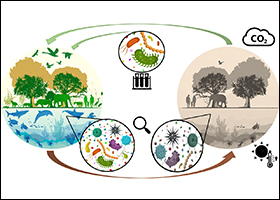- 4.2Impact Factor
- 7.7CiteScore
- 20 daysTime to First Decision
Microorganisms and Wildlife Conservation in the Face of Climate Change
This special issue belongs to the section “Environmental Microbiology“.
Special Issue Information
Dear Colleagues,
Climate change is one of the greatest threats to biodiversity. In particular, global warming is detrimentally impacting ecosystems worldwide and has contributed to substantial population declines in several keystone species. Microorganisms are the most evolutionarily and functionally diverse organisms in the biosphere and have unparalleled importance for the health of our planet through their intricate associations with metazoan hosts. Environmental stress related to climate change increases the global burden of disease by facilitating the emergence of novel pathogens and alters microbial relationships with hosts, often from a mutualistic to a pathogenic state. However, microorganisms can be used as sentinels of organism or ecosystem function during extreme environmental stress and can be used as tools for remediation and restoration.
An understanding of the functional roles of microorganisms for their hosts and how host–microbe interactions respond to environmental changes on various spatial- and time-scales is needed to project future alterations in wildlife populations and ecosystem function. This understanding can lead to creative tools to support conservation efforts across a variety of ecosystems.
For this Special Issue, we invite you to send contributions related to the intersection of host–microbe interactions and conservation science in the face of continued climate change.
Dr. Amanda ShoreGuest Editor
Manuscript Submission Information
Manuscripts should be submitted online at www.mdpi.com by registering and logging in to this website. Once you are registered, click here to go to the submission form. Manuscripts can be submitted until the deadline. All submissions that pass pre-check are peer-reviewed. Accepted papers will be published continuously in the journal (as soon as accepted) and will be listed together on the special issue website. Research articles, review articles as well as short communications are invited. For planned papers, a title and short abstract (about 250 words) can be sent to the Editorial Office for assessment.
Submitted manuscripts should not have been published previously, nor be under consideration for publication elsewhere (except conference proceedings papers). All manuscripts are thoroughly refereed through a single-blind peer-review process. A guide for authors and other relevant information for submission of manuscripts is available on the Instructions for Authors page. Microorganisms is an international peer-reviewed open access monthly journal published by MDPI.
Please visit the Instructions for Authors page before submitting a manuscript. The Article Processing Charge (APC) for publication in this open access journal is 2700 CHF (Swiss Francs). Submitted papers should be well formatted and use good English. Authors may use MDPI's English editing service prior to publication or during author revisions.
Keywords
- host–pathogen interaction
- microbial community
- conservation
- climate change
- beneficial microorganism
- disease
- wildlife management

Benefits of Publishing in a Special Issue
- Ease of navigation: Grouping papers by topic helps scholars navigate broad scope journals more efficiently.
- Greater discoverability: Special Issues support the reach and impact of scientific research. Articles in Special Issues are more discoverable and cited more frequently.
- Expansion of research network: Special Issues facilitate connections among authors, fostering scientific collaborations.
- External promotion: Articles in Special Issues are often promoted through the journal's social media, increasing their visibility.
- e-Book format: Special Issues with more than 10 articles can be published as dedicated e-books, ensuring wide and rapid dissemination.

